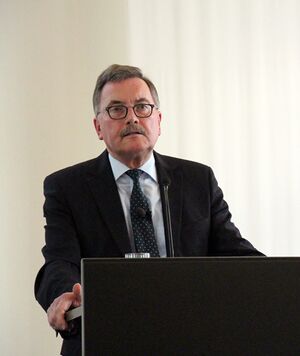Jürgen Stark
( central banker, economist) | |||||||||||||||||||||||||
|---|---|---|---|---|---|---|---|---|---|---|---|---|---|---|---|---|---|---|---|---|---|---|---|---|---|
 | |||||||||||||||||||||||||
| Born | 31 May 1948 | ||||||||||||||||||||||||
| Nationality | German | ||||||||||||||||||||||||
| Alma mater | • University of Hohenheim • University of Tübingen | ||||||||||||||||||||||||
| Member of | Bertelsmann Foundation | ||||||||||||||||||||||||
"Chief economist" of the European Central Bank for some years
| |||||||||||||||||||||||||
Jürgen Stark[1] is a German economist who has been a member of the Executive Board of the European Central Bank (ECB) from June 2006, but announced in September 2011 he would resign later that year. Within the Executive Board he was responsible for Economics and for Monetary Analysis and was often referred to as the "chief economist" of the ECB, although this is not an official title at the bank.
Contents
Background
Stark grew up in Rhineland-Palatinate. His father owned a vineyard in Gau-Odernheim in the Rheinhessen wine region. Stark, the second son, considered continuing in the family business. He studied economics at the University of Hohenheim and University of Tübingen, both near Stuttgart, from 1968 to 1973. During that time, he told an interviewer he participated in protests including against the Vietnam War: “We all, more or less at one point or time or another, had revolutionary ideas about what was just. But this was an episode that came to an end with the end of my studies. Then I became more serious.”[2]
He received a doctorate in 1975.
Career
From 1978 to 1998 Stark held economic policy positions in the German Federal Government. From September 1998 to May 2006 he served two consecutive terms as Vice President of the Bundesbank, acting as President of the bank in 2004.
On 9 September 2011, it was reported that Stark would leave the ECB due to disagreement with the bank's controversial bond-buying programme,[3] while the ECB officially announced his resignation as being for "personal reasons". Stark's term had been set to expire in May 2014. Although he has officially resigned, he will continue to discharge the duties of his post until a successor is appointed, before the end of 2011. Current deputy finance minister of Germany, Jörg Asmussen, has been nominated as Stark's successor.[4] In December, Stark spoke out against the idea of the International Monetary Fund becoming a major participant in broader efforts to address the European sovereign debt crisis. He envisioned instead, in an interview with the Sueddeutsche Zeitung, "an informal board of experts, which carefully checks the budgets of member states ... [, as] the nucleus for a future European finance ministry."[5]
Other activities
Corporate boards
Non-profit organizations
- Bertelsmann Stiftung, Member of the Board of Trustees (since 2012)[7]
- Free Democratic Party (FDP), Member of the Business Forum[8]
- Friedrich August von Hayek Foundation, Member of the Board of Trustees[9]
- Ifo Institute for Economic Research, Deputy Chairman of the Board of Trustees[10]
- Senckenberg Nature Research Society, Member of the Board of Trustees[11]
References
- ↑ https://archive.is/20120724195037/www.ecb.int/ecb/orga/decisions/html/cvstark.en.html
- ↑ http://www.ft.com/cms/s/2/a1f15ba0-b92c-11de-98ee-00144feab49a.html
- ↑ https://www.reuters.com/article/2011/09/09/us-ecb-stark-idUSTRE7883DF20110909
- ↑ https://www.economist.com/blogs/freeexchange/2011/09/ecbs-new-chief-economist
- ↑ http://www.marketwatch.com/story/ecbs-stark-opposes-major-imf-role-in-europe-rpt-2011-12-11?Link=obinsite
- ↑ http://media.amundi.com/amundi_press_en_uk/Pages/Communiques-de-presse/2016/Amundi-creates-a-Global-Advisory-Board-with-world-renowned-experts-in-global-economic-and-political-issues
- ↑ {https://www.focus.de/finanzen/news/wirtschaftsticker/unternehmen-kuratorium-der-bertelsmann-stiftung-erweitert-juergen-stark-neues-mitglied_aid_807558.html
- ↑ https://www.fdp.de/wirtschaftsforum
- ↑ https://www.hayek-stiftung.de/kuratorium.html Board of Trustees
- ↑ http://www.cesifo-group.de/de/ifoHome/CESifo-Group/ifo/ifo-Gremien/Kuratorium.html
- ↑ http://www.senckenberg.de/root/index.php?page_id=17049 Board of Trustees